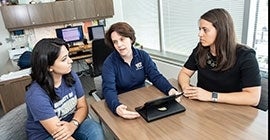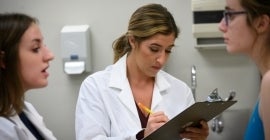- About
- Admissions
- Programs
- Students
- Faculty
- Research
- Institutional Research Training Grants
- Office of Research and Scholarship
- Nursing Research and Scholarship HUBS
- HUB for Excellence in Digital Health Research
- Genomics of Patient Outcomes HUB
- Sleep and Circadian Science Research Hub
- Nursing Health Services and Policy Research HUB
- Cancer Survivorship HUB
- Maternal/Perinatal and Reproductive Health Research Hub
- Aging and Gerontological Nursing Research HUB
- Nursing Education and Clinical Research for EBP HUB
- Active Grants
- Undergraduate Research
- Continuing Ed
- Alumni
- News
- Events
DNP Nurse Practitioner Major
Nurse Practitioners (NPs) are Advanced Practice Registered Nurses (APRN), academically prepared and employed as primary care and/or acute care providers in the U.S. health care system. In the University of Pittsburgh Doctor of Nursing Practice (DNP) Program applicants may select to be prepared in one of six NP specialty areas. NPs blend clinical expertise in health management and disease prevention to offer a wholistic perspective to health care. In addition, they use counseling and teaching skills to assist patients to make smarter lifestyle choices. This approach has been shown to lower healthcare costs and reduce hospitalizations.
Nurse practitioners serve as primary care providers in clinics, hospitals, home health care services, and outpatient care centers – many in traditionally underserved communities and regions. NPs are educationally prepared to autonomously diagnose and treat conditions, prescribe medications and order and interpret diagnostic tests, design treatment plans with patients, and teach patients about managing illnesses and understanding how to use their medications. State laws govern certification requirements and scope of practice. The U.S. government estimates that employment of nurse practitioners will grow by 46% by 2033.
In 2018 the National Organization of Nurse Practitioner Faculties (NONPF) made the commitment to move all entry-level nurse practitioner education to the DNP degree by 2025. In April 2023, NONPF reaffirmed the transition to the DNP degree for all entry-level NPs. The University of Pittsburgh School of Nursing's six NP areas of concentration are listed below:

Nurse Practitioner BSN to DNP Onsite

Nurse Practitioner BSN to DNP Distance Education Format
The following BSN to DNP NP specialty areas are available via distance education for qualified students per Policy 438:
- Adult-Gerontology Acute Care
- Adult-Gerontology Primary Care
- Family (Individual Across the Lifespan)

Nurse Practitioner MSN to DNP Onsite & Online
Beginning Fall 2017, out-of-state tuition rates for online cohorts will match the in-state rate, the online option is only available to applicants with a master’s degree in the same focus.
Additional Information
Graduates of the NP major are eligible to sit for discipline-specific national certification exams. The particular course of study, credit and clinical requirements, and certifications are outlined on each of the concentrations’ web pages. Each area of concentration requires successful completion of a comprehensive examination and a scholarly DNP project.
Accreditation Statement
The Doctor of Nursing Practice degree program at the University of Pittsburgh School of Nursing is accredited by the Commission on Collegiate Nursing Education (https://www.ccneaccreditation.org) from 02/24/2024 through 12/31/2034.
Nurse Practitioner Licensure/Certification
Most US states require professional licensure/certification to be employed as a nurse practitioner (NP). In most states, in addition to graduating from an accredited NP program, graduates must take and pass a recognized national certification examination in their area of preparation to be eligible for licensure/certification. Please visit Nursing Licensure.org for state-specific requirements.
